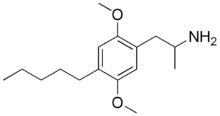 | |
 | |
| Names | |
|---|---|
| Preferred IUPAC name 1-(2,5-Dimethoxy-4-pentylphenyl)propan-2-amine | |
| Other names
DOAM; 2,5-Dimethoxy-4-amyl-amphetamine; 2,5-Dimethoxy-4-amyl-1-ethyl-(alpha-methyl)amine | |
| Identifiers | |
| CAS Number | |
| 3D model (JSmol) | |
| Abbreviations | DOAM |
| ChEMBL | |
| ChemSpider | |
| PubChem CID | |
| UNII | |
| CompTox Dashboard (EPA) | |
InChI
| |
SMILES
| |
| Properties | |
| Chemical formula | C16H27NO2 |
| Molar mass | 265.39 g/mol |
| Except where otherwise noted, data are given for materials in their standard state (at 25 °C , 100 kPa).
| |
Dimethoxy-4-amylamphetamine (DOAM) is a lesser-known psychedelic drug and a substituted amphetamine. DOAM was first synthesized by Alexander Shulgin. In his book PiHKAL (Phenethylamines i Have Known And Loved), the minimum dosage is listed as 10 mg, and the duration is unknown. DOAM produces a bare threshold and tenseness. As the 4-alkyl chain length is increased from shorter homologues such as DOM, DOET and DOPR which are all potent hallucinogens, the 5-HT2 binding affinity increases, rising to a maximum with the 4-(n-hexyl) derivative before falling again with even longer chains, but compounds with chain length longer than n-propyl, or with other bulky groups such as isopropyl, t-butyl or γ-phenylpropyl at the 4- position, fail to substitute for hallucinogens in animals or produce hallucinogenic effects in humans, suggesting these have low efficacy and are thus antagonists or partial agonists at the 5-HT2A receptor.
See also
References
- Shulgin AT, Dyer DC (December 1975). "Psychotomimetic phenylisopropylamines. 5. 4-Alkyl-2,5-dimethoxyphenylisopropylamines". Journal of Medicinal Chemistry. 18 (12): 1201–4. doi:10.1021/jm00246a006. PMID 1195275.
- Seggel MR, Yousif MY, Lyon RA, Titeler M, Roth BL, Suba EA, Glennon RA (March 1990). "A structure-affinity study of the binding of 4-substituted analogues of 1-(2,5-dimethoxyphenyl)-2-aminopropane at 5-HT2 serotonin receptors". Journal of Medicinal Chemistry. 33 (3): 1032–6. doi:10.1021/jm00165a023. PMID 2308135.
- Dowd CS, Herrick-Davis K, Egan C, DuPre A, Smith C, Teitler M, Glennon RA (August 2000). "1--2-aminopropanes as 5-HT(2A) partial agonists". Journal of Medicinal Chemistry. 43 (16): 3074–84. doi:10.1021/jm9906062. PMID 10956215.
- Kruegel AC. Phenalkylamines and Methods of Making and Using the Same. Patent WO 2022/192781
External links
This psychoactive drug-related article is a stub. You can help Misplaced Pages by expanding it. |